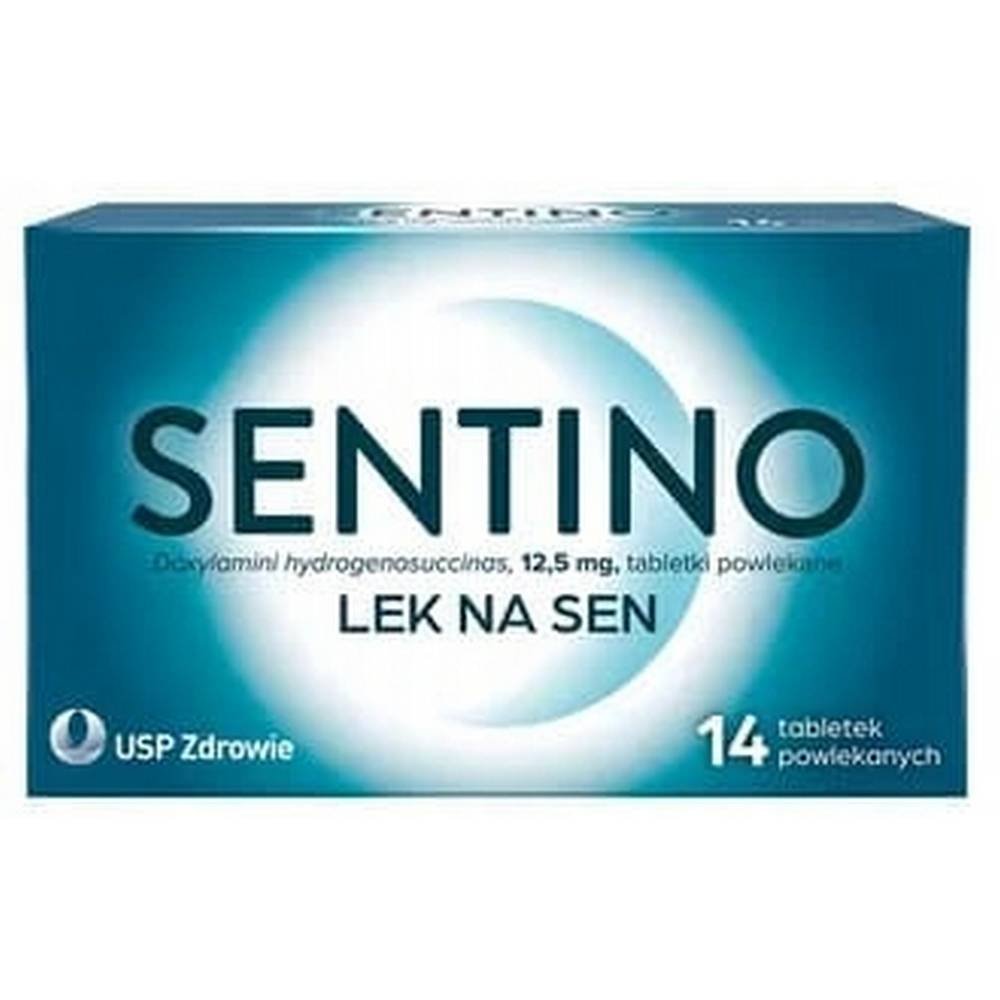- Sentino is a medicine containing the active substance doxylamine hydrogen succinate. Doxylamine belongs to the group of medicines with sleep-inducing and sedative effects.
- Composition:
The active substance is doxylamine hydrogen succinate (Doxylamini hydrogenosuccinas).
Each tablet contains 12.5 mg doxylamine hydrogen succinate.
- Indications:
difficulty falling asleep
frequent night waking
early morning waking due to stress or time zone changes
Properties:
The active substance of the medicine is classified as an antihistamine with a sedative and sedative effect.
- Use:
Always use this medicine exactly as described in the patient information leaflet or as directed by your doctor or pharmacist. If in doubt, consult your doctor or pharmacist.
Adults (aged 18 years and over): the recommended starting dose is 12.5 mg taken 30 minutes before bedtime. The dose can be increased to 25 mg if the initial dose does not provide sufficient relief from insomnia symptoms.
The maximum daily dose should not exceed 25 mg (2 tablets) per day.
The medicine should be taken orally. The tablets should be taken 30 minutes before going to bed with a sufficient amount of fluid (preferably water). Sentino can be taken with or after food.
The product should not be administered for longer than 7 days without consulting a doctor.
Use with other medicines:
Tell your doctor or pharmacist about all medicines you are taking, have recently taken or are planning to take. Do not use this medicine while taking the following medicines:
monoamine oxidase inhibitors (e.g. medicines used to treat depression, Parkinson’s disease or other diseases, such as moclobemide, phenelzine and tranylcypromine, isocarboxazid, linezolid, methylene blue, procarbazine, rasagiline and selegiline)
medicines such as: medicines used to treat heart rhythm disorders (amiodarone), some macrolide antibiotics (clarithromycin, erythromycin, telithromycin), some medicines that lower blood lipid (fat) levels (gemfibrozil), some medicines used to treat depression (antidepressants such as fluoxetine, fluvoxamine, paroxetine, bupropion, nefazodone), antiviral protease inhibitors (indinavir, ritonavir, telaprevir) and azole antifungals (fluconazole, ketoconazole, itraconazole, voriconazole, terbinafine)
Patients should avoid taking this medicine while taking the following medicines, as it may increase their effect or cause side effects:
adrenaline (used to treat low blood pressure)
some medicines used to treat malaria or some antihistamines
some diuretics (medicines that increase urine output)
alcohol and other medicines that depress the central nervous system, such as barbiturates, sleeping pills, sedatives, other medicines used to treat insomnia or anxiety disorders (alprazolam, diazepam, zolpidem), opioid painkillers (codeine), psychotropic medicines (chlorpromazine, risperidone, amitriptyline, trazodone) or procarbazine
antihypertensive medicines (medicines used to treat high blood pressure) that act on the central nervous system, such as guanabenz, clonidine or methyldopa
other drugs from the cholinolytic group, such as antipsychotics (used to treat mental disorders), drugs used to treat spasms (e.g. atropine, alkaloids of sedative herb) or disopyramide (used to treat certain heart conditions)
antihistamines applied to the skin (diphenhydramine in the form of a cream, ointment, aerosol) and scopolamine
medicinal products for which there are small differences between the therapeutic and toxic dose (e.g. phenytoin, digoxin, warfarin, lithium, aminoglycosides, vancomycin)
Use with food:
The medicinal product can be taken with or after food.
It is not recommended to drink grapefruit juice while taking the drug.
Do not drink alcohol while taking the drug.
- Contraindications:
Do not take this medicine if:
you are allergic to the active substance or any of the other ingredients of this medicine
you are allergic to other antihistamines (anti-allergic medicines)
you are breastfeeding
you have a respiratory disease such as asthma, chronic bronchitis (persistent cough accompanied by expectoration of sputum and mucus) or emphysema (difficulty breathing).
you have glaucoma (increased pressure in the eye)
you have prostate enlargement (excessive enlargement of the prostate gland), obstructed flow of urine from the bladder (urinary tract disease) or difficulty urinating
you have narrowing of the digestive tract due to a peptic ulcer or pyloroduodenal stenosis (difficulty passing food from the stomach to the intestine)
you are taking monoamine inhibitors
















Reviews
There are no reviews yet.